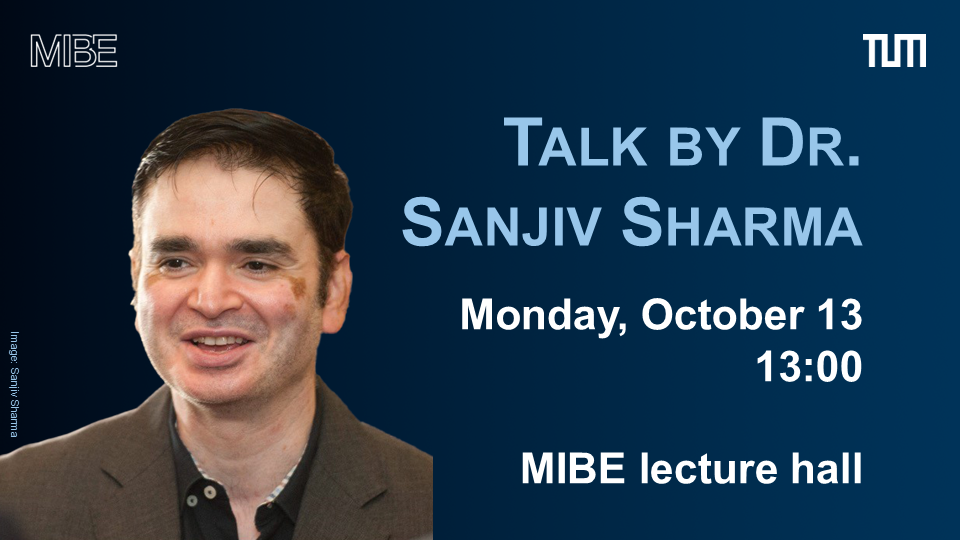Titel: Printed precision: How MIPs are reshaping biosensing for the clinic and beyond
Sprecher: Dr. Sanjiv Sharma (Senior Lecturer in Infectious Diseases and Antimicrobial Resistance, University of Liverpool)
Datum und Zeit: Montag, 13. Oktober 2025, um 13:00 Uhr
Abstract: Molecularly imprinted polymers (MIPs), often termed "plastic antibodies," offer a powerful route to achieving high sensitivity and selectivity in biomarker detection, especially when biological receptors are unstable, costly, or unavailable. In this talk, Dr. Sanjiv Sharma will present recent advances from his interdisciplinary group at the University of Liverpool, focusing on the integration of redox-active nanoMIPs onto printed and wearable biosensing platforms for point-of-care diagnostics.
Drawing on case studies from the UK-Japan MRC AMED consortium, Dr. Sharma will discuss how these synthetic receptors have enabled reliable, reagent-free detection of clinically relevant biomarkers such as phosphorylated tau (p-Tau181) and neurofilament light (NfL) directly in undiluted biofluids. He will also highlight his group's ongoing efforts to enhance diagnostic performance through dual-receptor strategies that combine the molecular recognition of aptamers with the robustness of nanoMIPs. These hybrid systems open new possibilities for precision diagnostics across neurology, infectious diseases, and critical care.
The talk will explore key considerations in material design, sensor integration, and translational challenges, with a view toward enabling scalable, low-cost diagnostics for global health applications.
Kurzbiografie
Dr. Sanjiv Sharma is a Senior Lecturer in Infectious Diseases and Antimicrobial Resistance within the David Price Evans Global Health and Infectious Diseases Group at the University of Liverpool's department of Pharmacology & Therapeutics, part of the Institute of Systems, Molecular and Integrative Biology. He is a Fellow of the Royal Society of Chemistry (FRSC) and the Higher Education Academy (FHEA).
Trained as a chemist, Dr. Sharma holds degrees from Dr. Hari Singh Gour University in Sagar, India, and completed his PhD through an Indo-European Communities Joint Research Programme in collaboration with the Universtiy of Amsterdam and the CSIR Regional Research Laboratory, India. He pursued postdoctoral research at the Institute of Nuclear Physics, Orsay, and Hôpital Saint-Antoine in Paris, followed by a Guest Scientist position at the Walter Schottky Institute, Technical University of Munich (TUM), working with Professors Gerhard Abstreiter and Mark Tornow.
He was awarded a prestigious Chevening Technology Fellowship, joining Imperial College London, where he later served as a Research Fellow. He subsequently held a Senior Lectureship at Swansea University before joining the University of Liverpool.
Dr. Sharma's research focuses on developing innovative biosensing and diagnostic technologies, including subdermal wearable biosensors, point-of-care diagnostics, and microfluidic platforms. His contributions span electrochemical biosensors, lab-on-a-chip systems, and transdermal drug and vaccine delivery devices.
He has been instrumental in advancing low-cost biosensing technologies from the laboratory to clinical and global health settings. To date, he has published over 85 peer-reviewed articles, book chapters, and conference papers, with more than 3,500 citations, an h-index of 26, and an i10-index of 39. His work has received national and international recognition, including the Chevening Technology Fellowship from the UK Foreign, Commonwealth & Development Office.
Beyond research, Dr. Sharma actively contributes to research strategy and governance. He serves on the Royal Society's Newton International Fellowships Committee and the UKRI Interdisciplinary Assessment College, and has reviewed for multiple Research Council funding panels. He has led several major interdisciplinary research programmes, collaborated with industry partners, and his work has been featured in the media, including the BBC, for its translational impact on public health.
Weitere Informationen
Die Veranstaltung findet in Präsenz im MIBE-Hörsaal (Boltzmannstr. 11, 85748 Garching b. München) ausschließlich auf Englisch statt.
